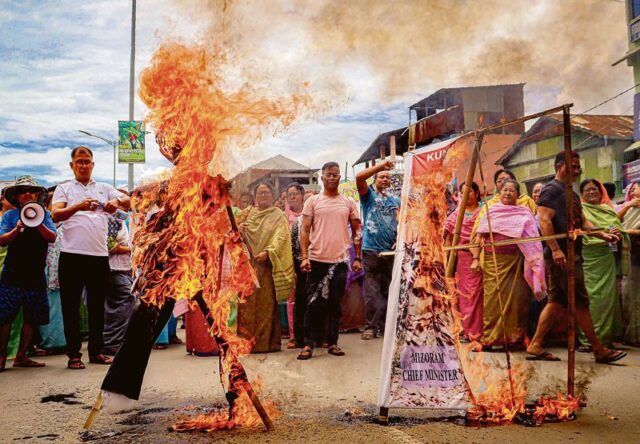
India’s Manipur State Addresses Violence Stemming from Myanmar Ahead of State Elections
Publication: Terrorism Monitor Volume: 22 Issue: 6
By:

Executive Summary
- Officials of India’s restive Manipur State are attempting to ensure that voting for the country’s lower house on April 19 remains peaceful. Sectarian strife in Manipur has been exacerbated by the influx of refugees from neighboring Myanmar.
- Manipur is a highly complicated region, with several different ethnic and religious communities competing for jobs, land, and rights.
With elections just around the corner, government officials in India’s restive state of Manipur are putting measures in place to ensure that voting remains peaceful. Elections to the country’s lower house, the Lok Sabha, are scheduled to begin on April 19. District magistrates, for example, passed an order requiring residents of Manipur to deposit their arms at the nearest police station until the elections are completed (Imphal Free Press, March 17). Various factors have contributed to the escalation of violence and instability in India’s far northeastern state, which extends beyond internal political and economic circumstances to encompass external influences.
Nevertheless, the longstanding competition for jobs, land, and rights has exacerbated the clash between two of Manipur’s ethnic groups—the Meiteis and Kukis. In May 2023, tensions were sparked after a court order extended the Scheduled Tribe (ST) list to only the Meitei. This means that the Meitei will enjoy a higher quota than the Kuki for placement in government jobs, educational institutions, and land grants (The Sangai Express, May 3, 2023). The clashes swiftly evolved into a confluence of security challenges, from counter-insurgency to cross-border criminal activity.
Manipur is a melting pot of diverse communities straddling ethnic and religious boundaries. The state comprises three principal ethnic groups: the Naga, the Hill Tribes (such as the Kuki and Zo, among others), and the Meitei. The current surge in violence stems from the aspirations and assertions of these ethnic identities, compounded by external influences (The Sangai Express, November 15, 2023). Myanmar’s continued airstrikes against Christians in their country have led to numerous refugees fleeing across the border to Manipur, joining many Burmese who have been exiled to India.
The Myanmar Factor and Manipur
Although the origin of the Manipur crisis lies primarily in internal factors related to the Kuki tribe being listed as an ST, the external elements stemming from Myanmar cannot be discounted. The porous nature of the India–Myanmar border persists primarily due to the implementation of the Free Movement Regime (FMR) (India Today, September 23, 2023). This agreement between Myanmar and India enables citizens residing within a 16-kilometer radius of the border to freely cross by obtaining a border pass from the appropriate authority, valid for one year.
Nearly 40,000 individuals have fled from Myanmar to Manipur since the country’s 2021 coup (The Sangai Express, November 15, 2023). For the most part, they come from the Kuki-Chin community, who are facing persecution under the ruling military junta. The ethno-linguistic bonds between the Chin community of Myanmar and the Kuki of Manipur mean that the influx of Chin individuals risks disrupting the precarious balance of resource distribution in an area already under sectarian stress (Outlook, October 25, 2022). Further, despite the support of the local population and state government, many people have crossed the Indian border illegally, which offers non-state actors the opportunity to capitalize on the situation for their own criminal interests (Frontier Myanmar, March 15, 2023).
Protecting Borders
The Chief Minister of Manipur, accompanied by his ministerial colleagues, convened a meeting with Union Home Minister Amit Shah in Delhi in May 2023. The purpose of this meeting was to brief Shah on the ongoing ethnic clashes between Meiteis and Kukis in Manipur and the effects of cross-border migration from Myanmar to India (India Today, May 15, 2023). The visit emphasized the need to secure India’s border with Myanmar. Preliminary measures to erect a wired fence along a trial stretch of 10 kilometers of the border have since commenced, as has procurement for an additional 80 kilometers of fencing (Nagaland Post, November 21, 2023).
Amid the ongoing turmoil, Indian Defense Secretary Shri Giridhar Aramane conducted an official visit to Myanmar in July 2023 (India Today, July 1, 2023). During this visit, he discussed illegal trans-border movement and transnational crimes like drug trafficking and arms smuggling with the Defense Minister of Myanmar, Gen (Ret.) Mya Tun Oo. The visit underscored the recognition by both governments of the inter-connectedness between the instability in Myanmar and the prevailing crisis in Manipur.
Conclusion
The crisis in Manipur presents multifaceted challenges for India, including a more sectarian bent on ethnic identity politics, violence, border security, and the proliferation of poppy cultivation and trade. The strife in Manipur originates from the often-contradictory historical narratives and perceptions of each community. In particular, interethnic harmony is impeded by the desire to brand one or another community’s members as “infiltrators” and deny them the recognition of indigenous status—and the benefits this would subsequently entail. Managing external factors, including mainly the Myanmar border, is pivotal to ensuring security and fostering peace among the residents of Manipur. The arrival of refugees or migrants from Myanmar is not unprecedented and has been a constant challenge, as it mirrors past occurrences of turmoil in Myanmar that led to an uptake in refugees in 2016 and 2017.
Furthermore, it is crucial to scrutinize the correlation between the decline in poppy cultivation in the Golden Triangle (Myanmar–Thailand–Laos tri-border area) and the subsequent shift of the drug corridor to the Myanmar–Manipur border areas. Manipur’s increasing integration with the regional drug economy stems notably from Myanmar (Transnational Institute, December 2021). Restoring normalcy and ending identity-based politics is imperative to addressing issues concerning illegal migrants, insurgent groups, poppy cultivation, and drug and arms trafficking and to ensure the upcoming elections in Manipur will be peaceful.



